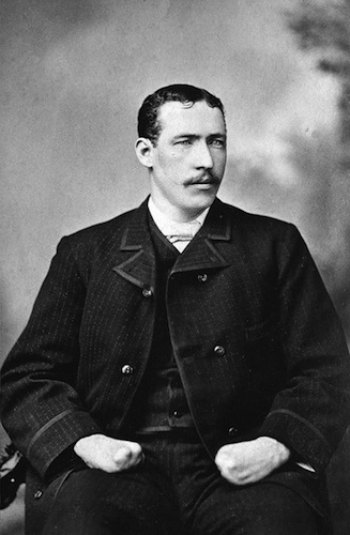Wanna Go Sailing?
As I comfort myself with the knowledge that my boat is, after all, securely moored in a sheltered harbor and that in a couple of days, 60-degree temperatures will melt all the ice, I think of the men who would routinely climb the rigging with axes in gale-force blizzards to chop away the ice before it had time to amass enough weight to capsize the vessel. Just all part of a day's work!
If you are skeptical when someone says, “They don't make men like that anymore,” did you ever hear tell of Howard Blackburn? In January of 1883, this Nova Scotia-born Gloucester fisherman was dory fishing for halibut from the schooner Grace L. Fears off the coast of Newfoundland. In a sudden snowstorm, the 24-year-old Blackburn and his dory mate Tom Welch lost sight of the schooner. Welch gave up hope and died after the first night of bailing the dory and busting the ice off its rails but Blackburn continued on for five days at sea without food, water or sleep, rowing the dory (with Welch's corpse) 60 miles with his mittenless hands frozen around his oars until he reached the coast where he buried Welch before losing all of his fingers and one toe to frostbite. Returning to Gloucester, MA in the spring, he opened a successful tavern where he amazed customers with his ability to palm coins off the bar with his fingerless hands.
But Blackburn never lost his love of adventure. In 1897 he joined a Klondike gold-prospecting schooner cruise around Cape Horn which ended in failure. Two years later he sailed the 30-foot sloop Great Western from Gloucester to England (alone and fingerless, no less)! And in 1901, he topped that by sailing the 25-foot sloop Great Republic from Gloucester to Portugal.

Of the Gloucester schoonermen Blackburn was among the more fortunate. He did, after all, live to the ripe old age of 72. As the Gloucester fishing fleet sailed out each winter, it was just a sad fact of life that some would not return. 1879 was probably their worst year with 29 schooners and a total of 240 men lost at sea. Of that number 13 schooners and 143 men perished in a single February gale.
And for what? Well, it all depended on luck. That and, of course, skill and backbreaking hard work. But if you didn't drown (and, as you can see, that was a pretty big IF) and if you managed to luck into a good catch of fish (another IF), you had a good chance of making a very decent living – two to three times the average family income. The fishermen were all paid in shares so they were likely to do better economically than their wage-earning brethren ashore if they could just manage to stay alive.
In my early schooner sailing days back in the 1980s, I read one of my favorite books on the Gloucester schooners, Fast & Able: Life Stories of Great Gloucester Fishing Vessels by Gordon W. Thomas,(1952). The book is full of detailed accounts and photographs of 76 schooners.
The schooner Mary F. Curtis was one of two fishing schooners chartered by Hollywood film studios for the 1937 movie Captains Courageous with Spencer Tracy. She carried cameras, film and equipment valued at $30,000 which was believed at the time to be the most valuable cargo any Gloucester schooner had ever had on board. The summer that I read that, I was sailing sunset cruises out of Hilton Head Island, S.C., and it occurred to me that it was a slow night indeed when my passengers on any given trip were not wearing more than that amount in clothes and jewelry!
I didn't contemplate turning pirate for more than a half hour before realizing that the number just seemed low because of a half century of inflation.
I have to admit that in this sort of weather, I'd a hell of a lot rather read a good book about sailing than go sailing myself. So if any of this has sparked your interest, in addition to Gordon Thomas's above-mentioned book, you might want to check out works of the late Joseph E. Garland like Down to the Sea: The Fishing Schooners of Gloucester, (Boston: David R. Godine, 1983) or Lone Voyager: The Extraordinary Adventures of Howard Blackburn Hero Fisherman of Gloucester, (Little, Brown 1963).



